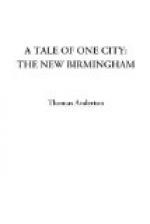One specially fortuitous event has stamped the Birmingham “music meeting” with a glory and prestige all its own. I refer to the production of Mendelssohn’s “Elijah” in 1846. This was, indeed, a piece of great good fortune, for Mendelssohn’s oratorio aroused an interest and enthusiasm throughout the musical world that has not yet died down. The occasion certainly gave the Birmingham Festivals a new lease of life, and attracted more musical pilgrims to our town than ever.
I am not old enough myself to recollect the first performance of the “Elijah,” and as I only propose to write down now what I have myself seen and heard, I refer those who desire to learn the history of the Festivals to the records written by other more or less accurate writers.
The first Festival at which I was present was that of 1852, and I have been at every Festival and at nearly every performance since that date. In the year mentioned I sang as a boy in the chorus, and experienced a great and novel joy that I have never known since. I revelled in the rehearsals, and when the week’s performances came I seemed to be up in the clouds amid cherubim and seraphim. Indeed, when at the last performance the National Anthem was sung and the meeting came to an end I could have sat down and wept.
Of course I recollect the stir made by the production of Costa’s “Eli” in 1855, and especially do I seem to remember Mr. Sims Beeves—then in his primest prime—and his thrilling declamation of the “War Song.” At the end of this stirring solo I recall how the voice of the great tenor rang out above the combined power of the full band and chorus.
In this connection I may mention that it was at the Festival of 1855 that I heard Mario for the first time. I had of course heard much of the great Italian tenor, but till the year mentioned had never heard the sound of his voice. Curiously enough, too, I heard him sing in juxtaposition with Mr. Sims Reeves. It was, indeed, a little bit of a contest between the two great tenors, and I am bound to say the English singer did not come off second best.
The fact is Mario was then past his prime, whilst Mr. Sims Reeves was in his fullest strength. The opportunities for comparison on the occasion referred to were irresistible, since the two tenors sang together in a trio in which they both had to sing the same notes. The result was as I have hinted, but I wondered, however, that comparisons should have been challenged in such a direct way, and I marvelled much that Mario should have submitted to such a trial.
It was at the Festival of 1858 that I heard the great Lablache for the first and only time. His appearance excited as much interest, perhaps more, than his singing—he was so very large. His ruddy countenance, his white hair, and his great girth, combined to make him something to see as well as hear. When he sang his notes were as the tones emitted from a sort of human tun.




